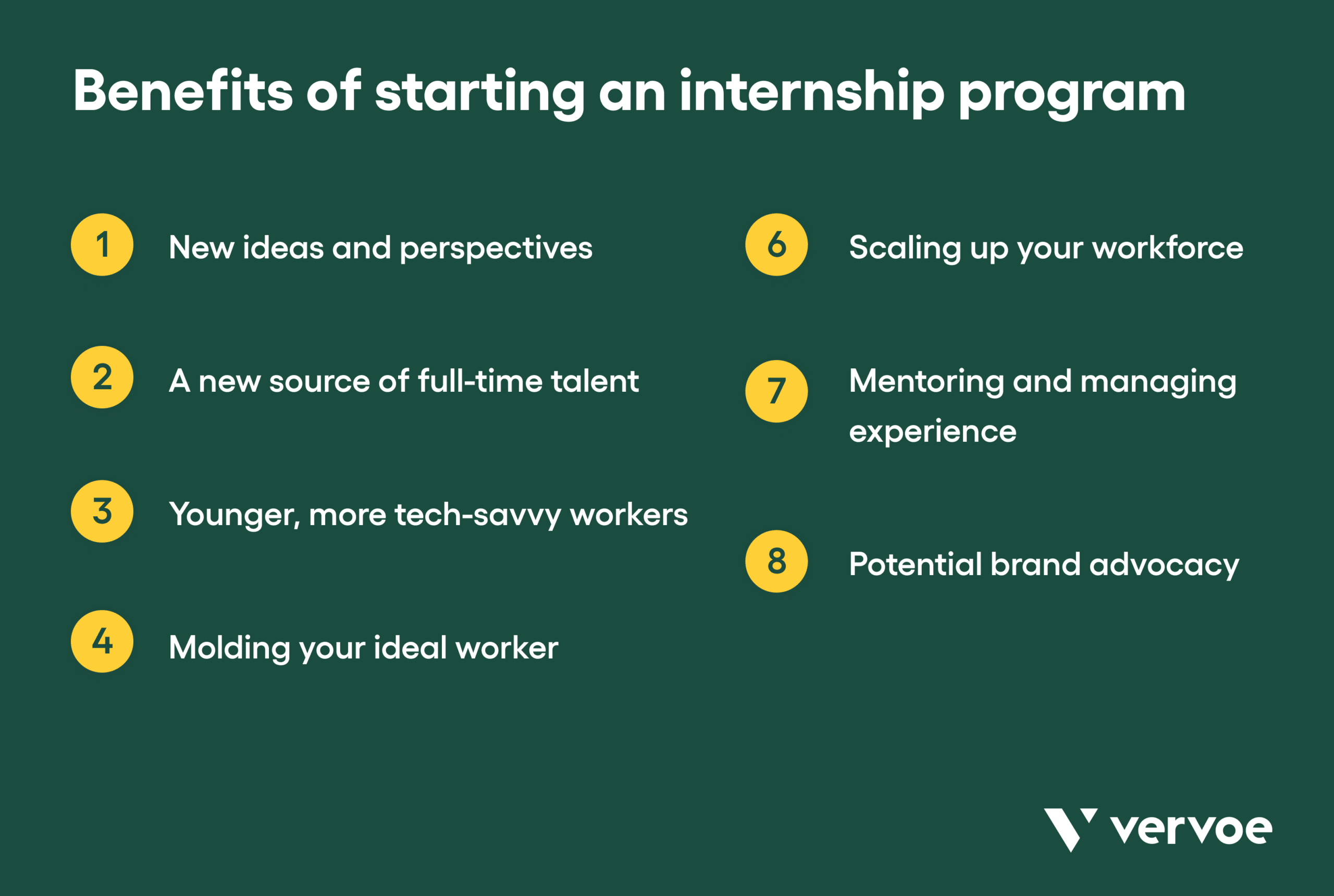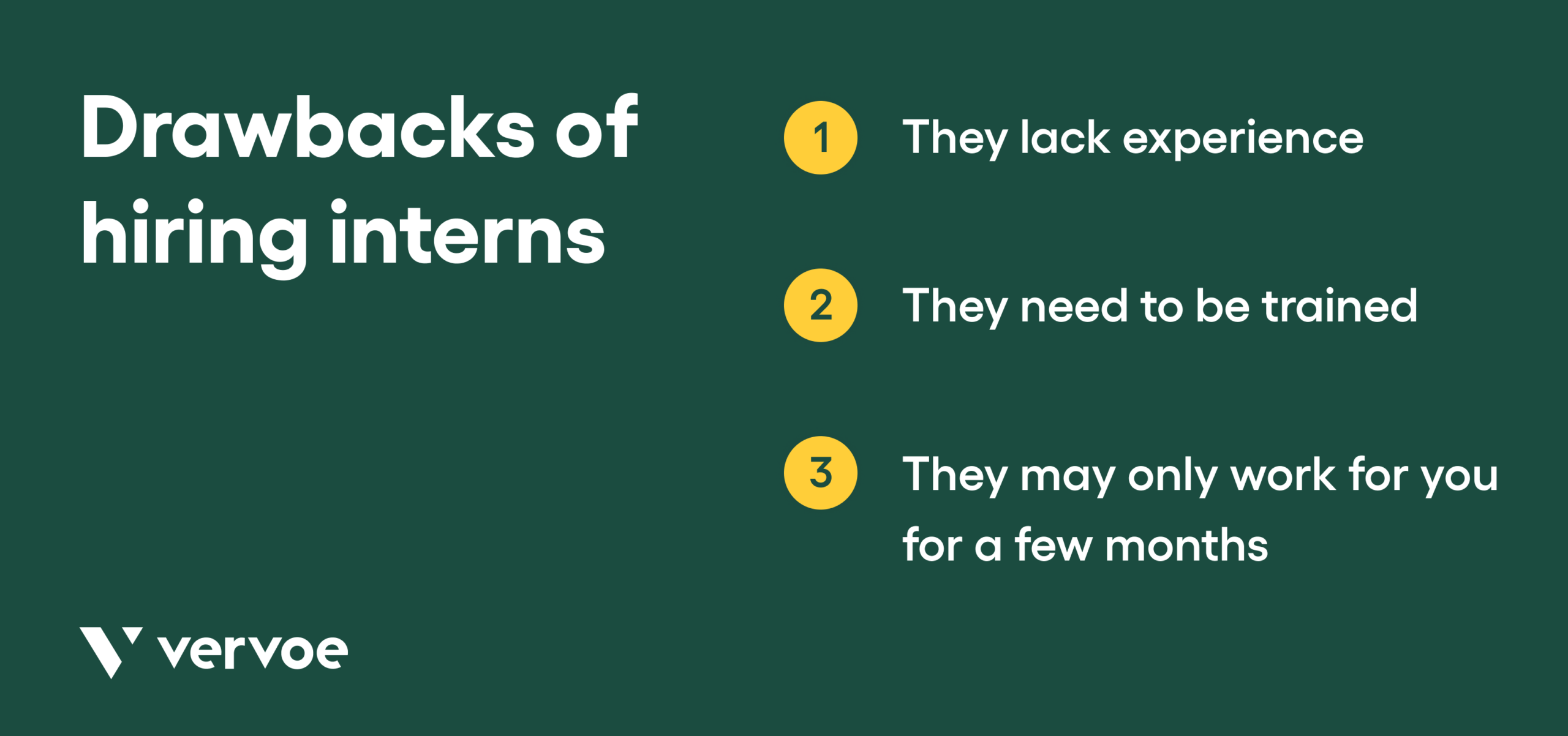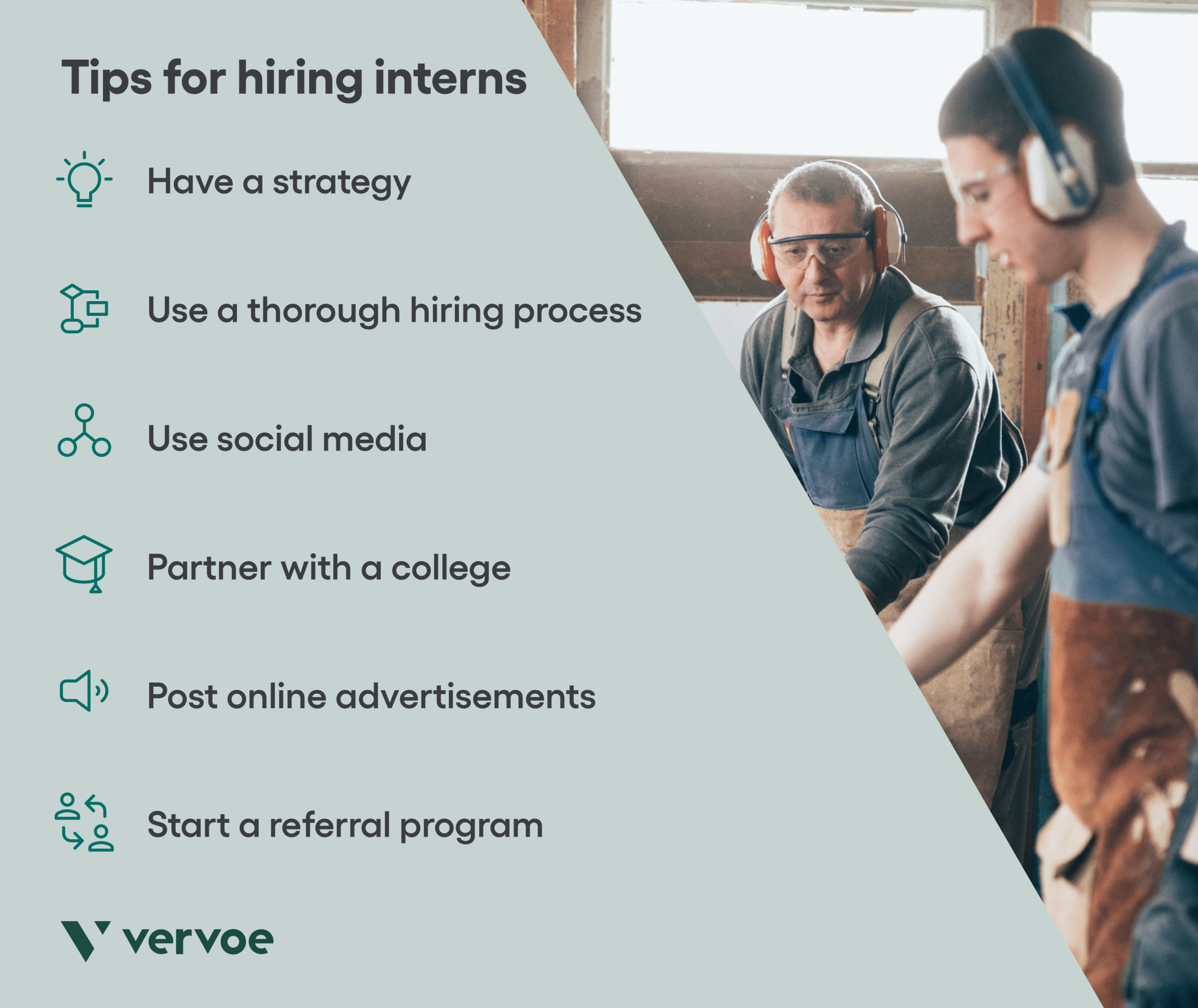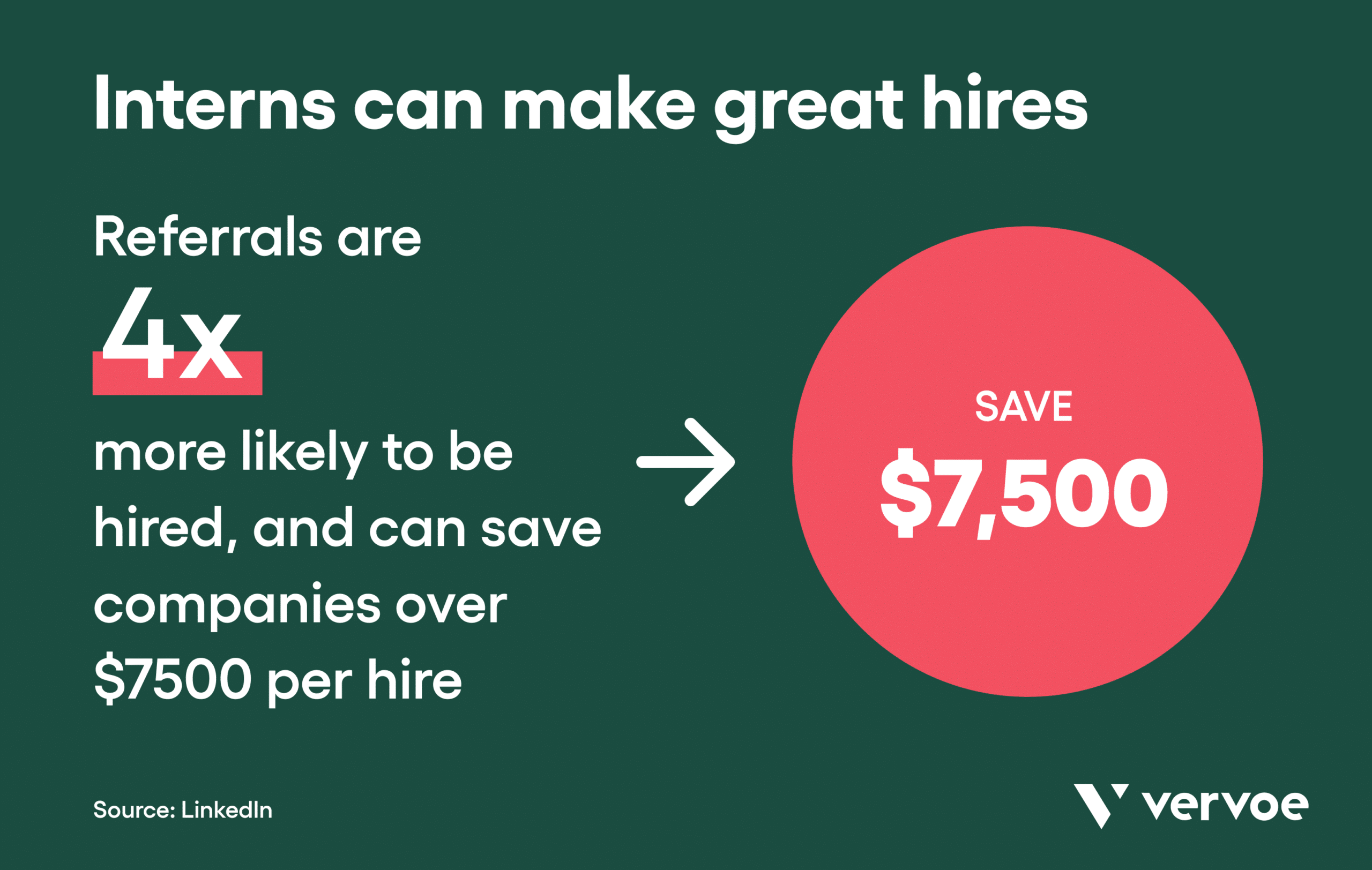When done right, internships are highly valuable for both interns and the companies hosting them.
Creating a well-thought-out and robust internship program can provide companies with a steady stream of new talent, the opportunity to take people with potential and mold them into the workers they need and additional workers to throw at complex problems.
Interns can offer fresh perspectives, creative thinking, and enthusiasm that – let’s face it – isn’t always present in the experienced full-time worker.
In this article, we demystify the process of building an effective internship program. We cover the benefits and potential drawbacks of internship programs, along with useful tips on how to start hiring interns.
Let’s begin with the benefits.
Benefits of starting an internship program
Hiring interns isn’t just about getting extra workers on deck, although this is often a consideration for companies experiencing rapid growth or a spike in demand. Here are some of the other benefits internship programs offer.
New ideas and perspectives
As we know from diversity hiring research, hiring outside of your usual candidate profile helps boost innovation by bringing fresh ideas to your organization. PwC’s internship program uses this approach, trying out people “who are a little different to those [they] would take on if they were making a permanent hire”, which is great for diversity.
Younger people lacking work experience (note that not all interns are young) will typically have a different perspective to older workers or those with prior experience. It could be that an intern changes the game by bringing a new viewpoint to an old problem.
A new source of full-time talent
According to the US-based National Association of Colleges and Employers, over 70% of employers end up offering their interns an employment contract. The key to success lies in creating a talent pipeline through a robust intern program rather than an in-and-out arrangement where student interns, paid interns or unpaid interns only stay for a few months.
Younger, more tech-savvy workers
The digital divide refers to the difference in computer literacy between generations who have grown up with the internet, social media, and other digital tools, and those who had to pick up these skills mid-career. While it is important to avoid age bias when hiring, organizations will inevitably seek out digital natives who can pick up new platforms with ease. Young interns fit this profile.
Molding your ideal worker
While the diversity of experience is important, there’s something to be said for a clean slate. This means hiring entry-level workers from educational institutions or elsewhere, free from preconceived ways of working or habits that are contrary to your preferences. Training interns from the ground up is arguably easier than attempting to tailor training to differing levels of hands on training or experience.
Scaling up your workforce
Along with hiring temporary workers for a trial period and seeking access to new pools of talent, hiring interns could be one of the ways your organization tackles the ongoing skills shortage. Short-term internships can be a highly effective way to scale up your workforce in response to increased demand without committing to making them full time employees.
Mentoring and managing experience
Interns will inevitably require guidance and supervision. Rather than adding to the workload of your existing management team, why not offer the supervisory role to someone who is seeking leadership experience? Mentoring or managing interns can be an excellent first step for those with ambitions to one day lead a team of their own.
Interns will be eager to learn skills ranging from communication to teamwork, presentation skills, time-management skills, leadership skills, career tips, and more.
Potential brand advocacy
Assuming your interns have a positive experience during their time with your organization, they could become brand advocates on social media both during their internship and after. Research has revealed that 76% of customers say they’re more likely to trust content shared by individuals over content shared by brands, while messages have 561% greater reach when shared by employees rather than the brand’s official social media channels.
In addition, employee advocacy can be a highly effective talent attraction tool. Companies with a successful employee advocacy program are 58% more likely to attract top talent.
Drawbacks to consider
Be aware of the following drawbacks when hiring interns.
They lack experience
Even if they’re considered qualified interns and have been trained in a college setting, interns typically lack on-the-job experience of putting those skills into practice. A lack of experience can lead to the intern making avoidable mistakes, feeling overwhelmed taking on too many tasks, or struggling with basic workplace skills and tasks such as time management and communication. However, these challenges can be minimized with the help of an empathetic and attentive manager.
Although an intern’s lack of experience can be frustrating, keep in mind that by hiring interns, you’re providing them with essential experience that will set them up for their entire career.
They need to be trained
It would be a rare find indeed to hire an intern who comes complete with the entire skill set needed for their role. While many skills can be picked up through local colleges and other training, skill sets will most likely need to be developed further through their internship experience to meet your organization’s needs.
Use a skills assessment to pinpoint the areas where your interns require additional development, determine if these skills can be improved through formal training, on-the-job learning, or mentoring. One of the most valuable ways to boost an intern’s skillset fast is to rotate them around various roles in the business.
They may only work for you for a few months
While some interns will become paid employees and work full time at the organization, others may only work for you for a few months. This can lead to a hesitancy to invest in training and will mean the interns’ workload will require redistribution when they move on.
Another challenge is that short-term interns will not be at your organization long enough to “master” the role. Consider hiring interns to assist with specific projects so the internship and the project conclude at the same time.
No matter how long an intern spends with your organization, the goal is to make sure there is mutual benefit for both the intern and the organization. Perhaps the internship means you don’t have to hire a temporary worker, or it provides current employees with valuable leadership experience.
How to hire interns
Hiring interns is a process that shares many of the same challenges involved in hiring permanent staff, particularly in terms of attracting top talent. Here are six tips for recruiting interns.
1. Have a strategy
An ad-hoc approach to internship opportunities will not generate the best results for your organization or the interns themselves. A robust internship program involves an end-to-end strategy for attracting, training, and making the very best use of interns. The goal is to create an ongoing pipeline of interns, constantly injecting new talent, new perspectives, and potential employees into the organization.
2. Use a thorough hiring process
Even though your assessment criteria may be different, you should still employ a rigorous hiring process for intern recruitment. This involves attracting, assessing, hiring, onboarding, and training interns to achieve the best-possible hiring outcomes for your company.
3. Use social media
Social media remains one of the most powerful tools to advertise for interns. Take a show, not tell approach to attracting interns using recruitment marketing by showing your interns in action with images and videos. When attempting to attract interns, think about what’s in it for them. For example, interns may ask themselves:
- Why should I do an internship at this organization?
- How will it benefit my future career and teach me new skills?
- What sort of perks is the company offering?
- What is the salary? Is it paid or unpaid internship?
- What sort of experience will I gain from this internship program?
- What does a day-in-the-life look like for this internship?
Incorporate the above questions into your recruitment videos to capture the attention of top talent and potential candidates with fun, inspiring stories.
4. Partner with a college
Working with an educational institution and creating college partnerships are excellent ways to recruit interns and reduce the monetary and financial burden of finding and attracting talent. College career fairs provide a forum where college students and employers can meet and discuss internship opportunities.
Another approach is to partner directly with the relevant faculty – for example, establishing a partnership with the engineering faculty in order to build a pipeline of engineering students who are eager to gain experience and earn college credit for their internships.
5. Post online advertisements
Much like recruitment for permanent positions, online advertisements are the essential first step for attracting interns into the recruitment funnel. Again, it is important to focus on what interns want from the program, such as experience, compensation, and fun. If you can, embed a video into your job ad that shows the unpaid or paid internships program in action.
Use college job boards and job boards offered by websites dedicated to connecting potential interns with employers such as Chegg Internships.
It pays to compile and include any relevant, powerful statistics that will add weight to your claims. For example, you might write that:
- X% of our interns transition to full-time positions with the company
- X% of our interns go on to work for Fortune 500 companies
- X% of our interns gave the internship program a score of 10/10
6. Start a referral program
Use a referral program to help ensure a full and continuous pipeline of internship candidates. This could involve asking your permanent employees to reach out to their alma maters, or asking current interns to recommend classmates who may be interested in applying for the program. If the suggestion leads to a successful hire, the referee is rewarded for their assistance.
According to LinkedIn, referrals are 4x more likely to be hired and save a company over $7500 per hire.
Best practices and things to avoid in internship programs
Here are some best-practice tips and warnings for running a successful internship program.
1. Consider the internship timeline
Think about when you will need an intern or interns, how long it will take to recruit them, and how long you would expect to employ them.
For example, a company planning a website refresh in June may begin the search for an intern in late April, and plan to employ the intern for five months, by which time the project should be completed.
2. Be clear about expectations and benefits
The worst internships involve managers who don’t know what to do with their interns. In this case, the intern is usually tasked with ‘busy-work’: filing, photocopying or fetching coffees. Before hiring an intern, determine exactly what you will need them for, what training they will require, and what they will be doing day-to-day. Work should be purposeful, meaningful, and rewarding.
Your job description should provide a detailed outline of the duties, responsibilities, and skills or attributes necessary for the intern to succeed in the role. It should provide information on the type of work the intern will do, how the work will be done, and the purpose of the role in the larger organization.
Do not put interns in a situation where the reality of the job doesn’t match what was promised in the job description.
3. Use internships as an opportunity to mold your future leaders
As mentioned above, internships are a fantastic opportunity for your future leaders to gain valuable people-management skills. Perhaps there is a high-potential person in your team who isn’t quite ready to lead a team of their peers but would benefit from the chance to develop a small team of interns.
4. Always pay your interns
Unpaid internships may make sense on paper: rather than monetary compensation, the intern gains valuable experience that result in academic credit and can be leveraged to win a coveted position in the future. However, unscrupulous employers have exploited unpaid interns to the point where many commentators are now calling for a legislated end to unpaid internship programs in the US and elsewhere.
Exploitation aside, another argument is that any employer that relies on the labor of unpaid interns does not have a valid for profit business model.
An unpaid intern or one earning below the minimum wage may be less motivated to work hard for your organization, while unpaid internships may also hold lesser value on a candidate’s resumé when they are looking for a permanent role.
Always pay your interns. Internship wages vary between industries and locations, ranging from the minimum wage to salaries that are competitive with those of permanent employees.
5. Communicate how they’re performing
Lacking experience, interns will need more assurance than other employees about how they are performing and where they need to improve. After you hire an intern, schedule regular performance reviews to identify areas for targeted improvement but be sure to provide positive feedback as well.
Making sure interns feel appreciated and valued will help boost retention, improve the employee experience, and increase the likelihood of the intern accepting an offer of permanent employment or ongoing work as an independent contractor.
6. Be clear about the possibility of a job at the end
There’s little point in keeping the possibility of a job at the end of an internship a secret. In fact, it could be a powerful motivator. The offer of a permanent employment contract when you hire interns can be used to increase positive competition amongst them, motivate interns to exceed their targets, and encourage them to build long-term relationships with your team.
On the flip side, don’t mislead interns with hints of a permanent job offer that does not exist. If the internship will only last for six months before they move on, be clear about the end date and what will happen to the potential job seeker at the program’s conclusion.
Find stand-out internship candidates quickly with Vervoe
Save time when hiring interns by testing a range of job-ready skills during the application process to help you shortlist great candidates early and decrease the time to offer by up to 90%.


























